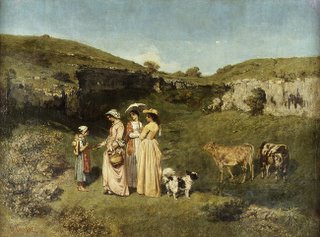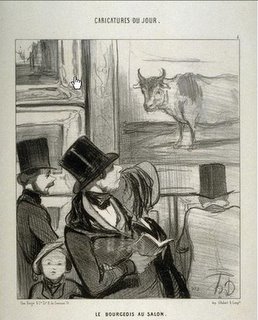Edouard Manet's Boating (1874) at the Met
 Here is our podcast of the beautiful painting by Manet of a couple boating on the Seine in the suburban town of Argenteuil.
Right click here to download or use the player below to listen.
Here is our podcast of the beautiful painting by Manet of a couple boating on the Seine in the suburban town of Argenteuil.
Right click here to download or use the player below to listen.
Audioguides (for a museum visit or just to listen online), Vodcasts & General Musings about using Technology to Teach with Images by two art historians Beth Harris & Steven Zucker
 Here is our podcast of the beautiful painting by Manet of a couple boating on the Seine in the suburban town of Argenteuil.
Right click here to download or use the player below to listen.
Here is our podcast of the beautiful painting by Manet of a couple boating on the Seine in the suburban town of Argenteuil.
Right click here to download or use the player below to listen.

 Right click here to download the mp3 or use the player below to listen to the podcast.
Right click here to download the mp3 or use the player below to listen to the podcast.
 I couldn't help but add the quotes below to accompany our discussion of Gerome's Pygmalion and Galatea in the Metropolitan Museum of Art.
Ovid's Metamorphosis:
Pygmalion had seen them, spending their lives in wickedness, and, offended by the failings that nature gave the female heart, he lived as a bachelor, without a wife or partner for his bed. But, with wonderful skill, he carved a figure, brilliantly, out of snow-white ivory, no mortal woman, and fell in love with his own creation. He marvels: and passion, for this bodily image, consumes his heart. Often, he runs his hands over the work, tempted as to whether it is flesh or ivory, not admitting it to be ivory. he kisses it and thinks his kisses are returned; and speaks to it; and holds it, and imagines that his fingers press into the limbs, and is afraid lest bruises appear from the pressure.
The day of Venus’s festival came...when Pygmalion, having made his offering, stood by the altar, and said, shyly: “If you can grant all things, you gods, I wish as a bride to have...” and not daring to say “the girl of ivory” he said “one like my ivory girl.” Golden Venus, for she herself was present at the festival, knew what the prayer meant, and as a sign of the gods’ fondness for him, the flame flared three times, and shook its crown in the air. When he returned, he sought out the image of his girl, and leaning over the couch, kissed her. She felt warm: he pressed his lips to her again, and also touched her breast with his hand. The ivory yielded to his touch, and lost its hardness, altering under his fingers....The lover is stupefied, and joyful, but uncertain, and afraid he is wrong, reaffirms the fulfilment of his wishes, with his hand, again, and again.
____________________________
Claribel Alegría, “Galatea Before the Mirror”:
my perfection isn’t mine
you invented it
I am only the mirror
in which you preen yourself
and for that very reason
I despise you.
_____________________________________
Simone de Beauvoir:
When I started writing -- it wasn't exactly memoirs, but an essay on myself -- I realized that I needed first of all to situate myself as a woman. So first I studied what it meant to be a woman in the eyes of others, and that's why I talked about the myths of woman as seen by men; then I realized it was necessary to go deeper to the heart of reality, and that is why I studied physiology, history, and the evolution of the female condition."
___________________________
Right click here to download the podcast or use the player below.
I couldn't help but add the quotes below to accompany our discussion of Gerome's Pygmalion and Galatea in the Metropolitan Museum of Art.
Ovid's Metamorphosis:
Pygmalion had seen them, spending their lives in wickedness, and, offended by the failings that nature gave the female heart, he lived as a bachelor, without a wife or partner for his bed. But, with wonderful skill, he carved a figure, brilliantly, out of snow-white ivory, no mortal woman, and fell in love with his own creation. He marvels: and passion, for this bodily image, consumes his heart. Often, he runs his hands over the work, tempted as to whether it is flesh or ivory, not admitting it to be ivory. he kisses it and thinks his kisses are returned; and speaks to it; and holds it, and imagines that his fingers press into the limbs, and is afraid lest bruises appear from the pressure.
The day of Venus’s festival came...when Pygmalion, having made his offering, stood by the altar, and said, shyly: “If you can grant all things, you gods, I wish as a bride to have...” and not daring to say “the girl of ivory” he said “one like my ivory girl.” Golden Venus, for she herself was present at the festival, knew what the prayer meant, and as a sign of the gods’ fondness for him, the flame flared three times, and shook its crown in the air. When he returned, he sought out the image of his girl, and leaning over the couch, kissed her. She felt warm: he pressed his lips to her again, and also touched her breast with his hand. The ivory yielded to his touch, and lost its hardness, altering under his fingers....The lover is stupefied, and joyful, but uncertain, and afraid he is wrong, reaffirms the fulfilment of his wishes, with his hand, again, and again.
____________________________
Claribel Alegría, “Galatea Before the Mirror”:
my perfection isn’t mine
you invented it
I am only the mirror
in which you preen yourself
and for that very reason
I despise you.
_____________________________________
Simone de Beauvoir:
When I started writing -- it wasn't exactly memoirs, but an essay on myself -- I realized that I needed first of all to situate myself as a woman. So first I studied what it meant to be a woman in the eyes of others, and that's why I talked about the myths of woman as seen by men; then I realized it was necessary to go deeper to the heart of reality, and that is why I studied physiology, history, and the evolution of the female condition."
___________________________
Right click here to download the podcast or use the player below.